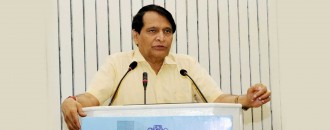The move forces China to implement the ruling within a reasonable period of time and remove export restrictions on rare earth metals
The Dollar Business Bureau | @TheDollarBiz
 The World Trade Organisation’s (WTO) Dispute Settlement Body (DSB), which oversees disputes among WTO members, has adopted the Appellate Body report that says that China’s export restrictions on rare earths, tungsten and molybdenum breach WTO rules and are not justified under Article XX of the GATT 1994.
China is the world’s largest producer of rare earths, tungsten and molybdenum, which are key raw materials used to make electronic goods, computers and several other high technology goods such as weapons, turbines, mobile phones, lenses and TVs. China’s share of world’s rare earth production stands at a whopping 90% and impacts world economy and trade significantly.
Despite agreeing to remove export duties under its accession to WTO, China imposes export restrictions on rare earths saying that such measures are required to conserve the country’s exhaustible natural resources, and reduce pollution. According to WTO findings, China imposes three broad restrictions on the export of rare earths, tungsten, and molybdenum: duties on the export of various forms of the materials; quota on export quantities of such products and raw materials; and limitations on the companies that export the materials.
However, industries in USA, EU and Japan (the co-complainants in the case) claim that China is not entitled to impose such restrictions which are actually meant to offer an unfair advantage to Chinese companies and prop-up prices. “At times, non-Chinese buyers have been forced to buy their raw materials at a price that is more than twice as high as that paid by Chinese firms,” EU said.
The WTO Panel agreed. Investigations found that China does not impose any restrictions on domestic production or consumption of rare earths, which suggests that China’s export quotas were meant to achieve industrial policy goals rather than conservation. The WTO Panel said, “The overall effect of the foreign and domestic restrictions is to encourage domestic extraction and secure preferential use of those materials by Chinese manufacturers.”
While USA, Japan, and EU have welcomed the decision, China has termed it unfortunate.
The World Trade Organisation’s (WTO) Dispute Settlement Body (DSB), which oversees disputes among WTO members, has adopted the Appellate Body report that says that China’s export restrictions on rare earths, tungsten and molybdenum breach WTO rules and are not justified under Article XX of the GATT 1994.
China is the world’s largest producer of rare earths, tungsten and molybdenum, which are key raw materials used to make electronic goods, computers and several other high technology goods such as weapons, turbines, mobile phones, lenses and TVs. China’s share of world’s rare earth production stands at a whopping 90% and impacts world economy and trade significantly.
Despite agreeing to remove export duties under its accession to WTO, China imposes export restrictions on rare earths saying that such measures are required to conserve the country’s exhaustible natural resources, and reduce pollution. According to WTO findings, China imposes three broad restrictions on the export of rare earths, tungsten, and molybdenum: duties on the export of various forms of the materials; quota on export quantities of such products and raw materials; and limitations on the companies that export the materials.
However, industries in USA, EU and Japan (the co-complainants in the case) claim that China is not entitled to impose such restrictions which are actually meant to offer an unfair advantage to Chinese companies and prop-up prices. “At times, non-Chinese buyers have been forced to buy their raw materials at a price that is more than twice as high as that paid by Chinese firms,” EU said.
The WTO Panel agreed. Investigations found that China does not impose any restrictions on domestic production or consumption of rare earths, which suggests that China’s export quotas were meant to achieve industrial policy goals rather than conservation. The WTO Panel said, “The overall effect of the foreign and domestic restrictions is to encourage domestic extraction and secure preferential use of those materials by Chinese manufacturers.”
While USA, Japan, and EU have welcomed the decision, China has termed it unfortunate.

 The World Trade Organisation’s (WTO) Dispute Settlement Body (DSB), which oversees disputes among WTO members, has adopted the Appellate Body report that says that China’s export restrictions on rare earths, tungsten and molybdenum breach WTO rules and are not justified under Article XX of the GATT 1994.
China is the world’s largest producer of rare earths, tungsten and molybdenum, which are key raw materials used to make electronic goods, computers and several other high technology goods such as weapons, turbines, mobile phones, lenses and TVs. China’s share of world’s rare earth production stands at a whopping 90% and impacts world economy and trade significantly.
Despite agreeing to remove export duties under its accession to WTO, China imposes export restrictions on rare earths saying that such measures are required to conserve the country’s exhaustible natural resources, and reduce pollution. According to WTO findings, China imposes three broad restrictions on the export of rare earths, tungsten, and molybdenum: duties on the export of various forms of the materials; quota on export quantities of such products and raw materials; and limitations on the companies that export the materials.
However, industries in USA, EU and Japan (the co-complainants in the case) claim that China is not entitled to impose such restrictions which are actually meant to offer an unfair advantage to Chinese companies and prop-up prices. “At times, non-Chinese buyers have been forced to buy their raw materials at a price that is more than twice as high as that paid by Chinese firms,” EU said.
The WTO Panel agreed. Investigations found that China does not impose any restrictions on domestic production or consumption of rare earths, which suggests that China’s export quotas were meant to achieve industrial policy goals rather than conservation. The WTO Panel said, “The overall effect of the foreign and domestic restrictions is to encourage domestic extraction and secure preferential use of those materials by Chinese manufacturers.”
While USA, Japan, and EU have welcomed the decision, China has termed it unfortunate.
The World Trade Organisation’s (WTO) Dispute Settlement Body (DSB), which oversees disputes among WTO members, has adopted the Appellate Body report that says that China’s export restrictions on rare earths, tungsten and molybdenum breach WTO rules and are not justified under Article XX of the GATT 1994.
China is the world’s largest producer of rare earths, tungsten and molybdenum, which are key raw materials used to make electronic goods, computers and several other high technology goods such as weapons, turbines, mobile phones, lenses and TVs. China’s share of world’s rare earth production stands at a whopping 90% and impacts world economy and trade significantly.
Despite agreeing to remove export duties under its accession to WTO, China imposes export restrictions on rare earths saying that such measures are required to conserve the country’s exhaustible natural resources, and reduce pollution. According to WTO findings, China imposes three broad restrictions on the export of rare earths, tungsten, and molybdenum: duties on the export of various forms of the materials; quota on export quantities of such products and raw materials; and limitations on the companies that export the materials.
However, industries in USA, EU and Japan (the co-complainants in the case) claim that China is not entitled to impose such restrictions which are actually meant to offer an unfair advantage to Chinese companies and prop-up prices. “At times, non-Chinese buyers have been forced to buy their raw materials at a price that is more than twice as high as that paid by Chinese firms,” EU said.
The WTO Panel agreed. Investigations found that China does not impose any restrictions on domestic production or consumption of rare earths, which suggests that China’s export quotas were meant to achieve industrial policy goals rather than conservation. The WTO Panel said, “The overall effect of the foreign and domestic restrictions is to encourage domestic extraction and secure preferential use of those materials by Chinese manufacturers.”
While USA, Japan, and EU have welcomed the decision, China has termed it unfortunate.






 to success.
to success.